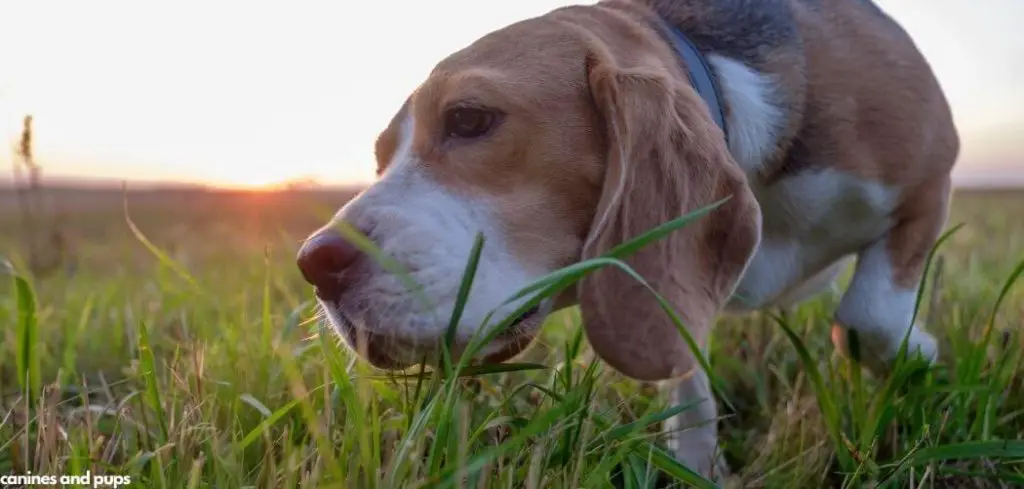When a dog begins eating grass excessively while also licking constantly, it can be confusing and concerning for pet owners.
While some grass chewing can be normal, pairing it with obsessive licking may point to underlying health or behavioral issues that should not be ignored.
We outline the common reasons why a dog may eat grass and lick excessively, what you can do, and when to seek veterinary help.
Dog Eating Grass and Excessively Licking — Why It Happens
Dogs may eat grass and lick excessively for a variety of reasons, including digestive upset, nausea, anxiety, nutritional deficiencies, or even dental issues. These behaviors can sometimes be linked, as a dog may lick excessively when nauseous and turn to grass as a way to soothe their stomach.
In other cases, the behavior may be more rooted in stress or an underlying medical condition such as gastrointestinal disease or liver problems.

Dog Eating Grass and Excessively Licking: Common Causes
Gastrointestinal Upset
One of the most common explanations is that a dog’s stomach is upset. Dogs may eat grass in an attempt to induce vomiting or to settle nausea, while licking surfaces, paws, or even the air can be a companion sign of nausea.
Owners often notice this behavior after their dog eats something unusual, switches diets, or develops gastritis. It can be concerning because frequent stomach upset may signal a more chronic digestive disorder that needs veterinary evaluation.
Read more: Dog Eating Grass Excessively and Drooling (What this means)
Acid Reflux
Acid reflux, or gastroesophageal reflux disease, can cause irritation of the stomach and throat. Dogs experiencing reflux often lick their lips, floors, or bedding excessively due to the discomfort.
They may also eat grass to try to neutralize the burning sensation or to prompt regurgitation. If left untreated, reflux can cause ongoing discomfort and damage to the esophagus, making veterinary care essential.
Anxiety and Stress
Excessive licking is a well-known stress behavior in dogs. Paired with grass eating, this may suggest that the dog is using these repetitive actions as a self-soothing mechanism.
Dogs with separation anxiety, environmental stress, or boredom may begin to display these behaviors more frequently. While it may not always be physically harmful, the emotional toll and potential ingestion of harmful substances make it a behavior worth addressing.
Nutritional Deficiencies
Some dogs eat grass and lick excessively because their diet is lacking in certain nutrients, particularly fiber. Grass provides a roughage-like effect, and licking may be a signal of craving or imbalance.
Though less common in dogs on high-quality, complete diets, nutritional gaps may appear in pets eating homemade meals, unbalanced foods, or in older dogs whose absorption of nutrients is compromised.
Dental or Oral Pain
Excessive licking may also stem from oral discomfort. Dogs with gum disease, broken teeth, or mouth ulcers may lick to cope with pain. Eating grass can accompany this if chewing plants feels soothing against irritated gums.
Since dental issues often worsen silently, pairing them with behavioral changes like licking and grass eating may be a clue that a vet exam and dental care are necessary.
Liver or Pancreatic Disease
In more serious cases, excessive licking and eating grass can signal liver or pancreatic problems. Dogs with liver disease may experience nausea and strange appetite changes, while pancreatic inflammation (pancreatitis) is notorious for causing digestive upset and licking behaviors.
These conditions require veterinary attention, as they can be life-threatening if untreated. Owners may also notice vomiting, diarrhea, weight loss, or lethargy alongside these behaviors.
What to Do If Your Dog Is Eating Grass and Excessively Licking
If the behavior happens occasionally and your dog is otherwise healthy, it may not be a cause for immediate concern. Make sure your dog’s diet is balanced and free from gaps, and provide plenty of stimulation to reduce stress-driven behaviors.
Offering safe chew toys, structured exercise, and calming routines can reduce anxiety-driven licking. Switching to smaller, more frequent meals may help with mild digestive upset.
Always ensure your dog is not eating grass treated with pesticides, fertilizers, or chemicals, as these can be toxic. Providing access to safe, natural grass or dog-safe greens may help curb the urge.
If the behavior is persistent, worsening, or paired with other concerning signs, veterinary consultation is the next step.
When to Call or Visit Your Vet
Contact your veterinarian if your dog’s grass eating and licking are frequent or paired with symptoms such as vomiting, diarrhea, drooling, coughing, or lethargy.
Seek urgent care if you notice blood in vomit, sudden refusal to eat, abdominal bloating, or collapse. These could be signs of serious conditions like gastrointestinal obstruction, pancreatitis, or liver disease.
Even in less urgent cases, consistent excessive licking and grass eating deserve medical evaluation to rule out underlying problems and ensure your dog’s comfort.
Read more: Dog Eating Grass Excessively (Here’s Why)
Key Takeaway
Dogs may eat grass and lick excessively for reasons ranging from mild stomach upset to serious health problems. Occasional behavior might not be harmful, but persistent or worsening patterns should not be ignored.
Monitoring your dog closely, ensuring a safe environment, and consulting your veterinarian when needed are the best steps you can take.
With the right attention, you can determine whether it’s just a quirky habit or a sign of something requiring medical care.
